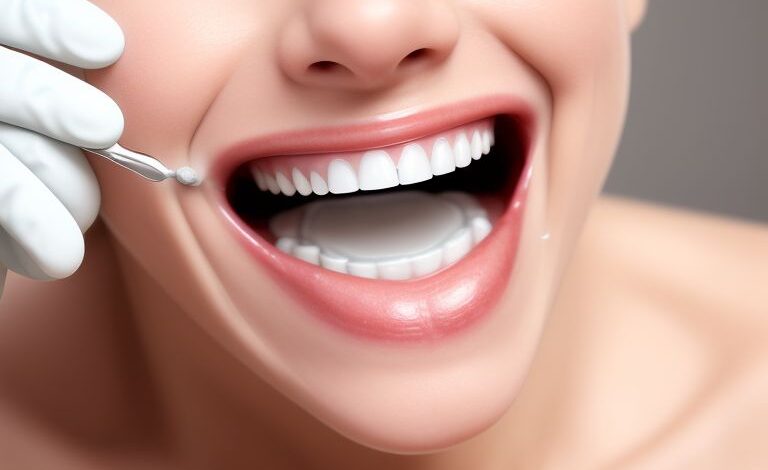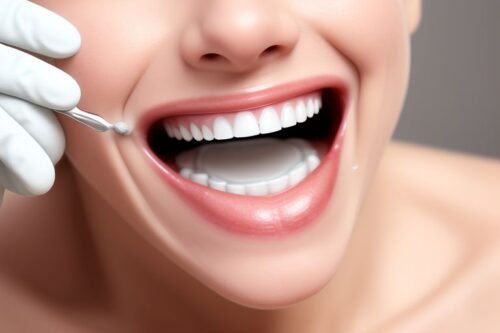Does Baking Soda Whiten Teeth? The Ultimate Guide to a Bright Smile

Can Baking Soda Really Whiten Teeth?
We all want a brighter, whiter smile, but does baking soda really help? Baking soda, or sodium bicarbonate, has been used for various household purposes, but it's increasingly popular in dental care. Its ability to remove surface stains makes it appealing as a natural remedy for teeth whitening.
In this in-depth guide, we’ll explore whether baking soda can truly whiten teeth, how safe it is to use, and other alternatives you might want to consider for a whiter, healthier smile. You’ll find answers to your questions and tips to maximize your dental health while whitening your teeth naturally.

1. What Makes Baking Soda an Effective Teeth Whitener?
Baking soda is a mild abrasive, meaning it can help scrub away surface stains caused by coffee, tea, and other foods that discolor teeth. It has been a go-to for years in natural oral care products because of its ability to neutralize acids and fight bad breath.
The real power behind baking soda for whitening lies in its abrasiveness. It’s this gentle scrubbing action that helps lift away stains without damaging the enamel if used properly. Additionally, its alkaline nature neutralizes acids that lead to tooth decay and gum disease, making it a multifunctional home remedy.
2. How Does Baking Soda Whiten Teeth?
Baking soda works by exfoliating the outer layer of your teeth. When you brush your teeth with a mixture of water and baking soda, you’re essentially buffing away the stains that sit on the enamel.
Here's the science: Teeth stains occur primarily on the outer enamel and are often due to food and drink consumption. Baking soda is not strong enough to penetrate deeply, so its whitening effect is limited to surface stains. However, this makes it a safer option compared to harsher chemical teeth whiteners.
Pros of Baking Soda:
- Non-toxic and affordable: Baking soda is one of the least expensive and most accessible whitening agents.
- Mild abrasiveness: It removes surface stains gently, which can prevent over-scrubbing and enamel damage.
- Odor-neutralizing properties: It fights bad breath by neutralizing acids in the mouth.
Cons of Baking Soda:
- Limited results: It only works on surface stains; deeper stains may require professional treatment.
- Overuse can cause enamel damage: Using it too frequently or aggressively can wear down enamel over time, making teeth more sensitive.
3. Is It Safe to Use Baking Soda on Teeth?
Safety is a key concern when it comes to any dental practice. Baking soda, while effective, can pose risks if misused. Because it’s abrasive, using it daily or applying too much pressure while brushing can lead to enamel erosion.
How often should you use baking soda for teeth whitening? Experts recommend using baking soda no more than once or twice a week. Overuse may lead to tooth sensitivity and increased vulnerability to cavities, as enamel plays a critical role in protecting your teeth from decay.
Pro Tip: Always use a soft-bristle brush when applying baking soda to your teeth. This reduces the risk of damaging the enamel.
4. Step-by-Step Guide: How to Use Baking Soda for Teeth Whitening
If you’re convinced baking soda is right for you, here’s a simple guide to using it safely and effectively:
1. Prepare the mixture:
- Mix 1 teaspoon of baking soda with a few drops of water to form a paste. It should be thick enough to stick to your toothbrush without being runny.
2. Apply to teeth:
- Dip your toothbrush into the mixture and brush gently in circular motions for 2 minutes. Be sure to avoid scrubbing too hard, as this can damage your enamel.
3. Rinse thoroughly:
- After brushing, rinse your mouth well with water to remove any remaining baking soda residue.
4. Follow up with regular toothpaste:
- To ensure that your teeth are properly cleaned and protected, follow up with fluoride toothpaste. This helps maintain the integrity of your enamel.
5. Repeat sparingly:
- Stick to using baking soda no more than 1-2 times a week. Avoid making it a daily habit to protect your enamel.
Alternatives to Baking Soda:
- Hydrogen Peroxide: Often used in combination with baking soda for enhanced whitening effects.
- Activated Charcoal: Another natural remedy, though it comes with its own risks of abrasion.
- Whitening Toothpastes: Many over-the-counter options are designed for everyday use and can help maintain whitening results.
5. What Do Dentists Say About Baking Soda for Whitening Teeth?
It’s always a good idea to consult a dentist before making changes to your oral care routine. While baking soda is a popular home remedy, many dentists are cautious about recommending it for regular use due to the potential for enamel damage.
Most professionals agree that, used in moderation, baking soda can be an effective tool in removing surface stains. However, for those looking for more dramatic whitening results, professional treatments or over-the-counter whitening products may be a better option.
Dr. Sarah Edwards, DDS, explains, “Baking soda is safe when used correctly, but it’s not a substitute for professional whitening. If you want long-lasting, deeper whitening, consider visiting your dentist.”
6. Are There Better Teeth Whitening Alternatives?
While baking soda is a natural and affordable option, it’s not the only teeth whitening solution. Depending on your needs and preferences, you may want to explore other methods that offer longer-lasting and more comprehensive whitening effects.
a. Professional Whitening:
Professional treatments performed by dentists involve stronger whitening agents that penetrate deeper into the enamel. This option provides the most effective results but can be costly.
b. Over-the-Counter Whitening Kits:
There are plenty of home whitening kits available that use peroxide-based gels to whiten teeth. These kits tend to be more powerful than baking soda and offer noticeable results in a shorter time frame.
c. Whitening Toothpaste:
For those looking for a gentle daily option, whitening toothpaste can be a good alternative. Most of these contain small amounts of abrasive agents and peroxide to lift stains over time.
d. Natural Remedies:
Beyond baking soda, some people turn to other natural solutions like apple cider vinegar or coconut oil pulling. These methods, while popular, also have limited scientific backing.
7. Potential Side Effects of Using Baking Soda on Teeth
While baking soda is generally safe for short-term use, there are some potential risks you should be aware of:
- Enamel Erosion: Overuse of abrasive substances like baking soda can wear down enamel, leaving teeth more susceptible to cavities and sensitivity.
- Gum Irritation: If baking soda comes into direct contact with your gums too frequently, it may cause irritation or inflammation.
- Minimal Whitening Effects: If you have deeper stains or discoloration, baking soda alone may not provide the results you’re hoping for.
8. Baking Soda vs. Other Whitening Methods: Which Is Best?
There are plenty of whitening options out there, but which one is right for you? Here’s a quick comparison of baking soda with other common teeth whitening methods:
| Whitening Method | Effectiveness | Cost | Time for Results | Safety |
|---|---|---|---|---|
| Baking Soda | Moderate | Very Low | Several Weeks | Safe (with moderate use) |
| Professional Whitening | High | Expensive | Immediate | Very Safe |
| Whitening Toothpaste | Low to Moderate | Low | Several Weeks | Safe |
| Hydrogen Peroxide | Moderate | Low | 1-2 Weeks | Moderate Risk |
| Activated Charcoal | Low to Moderate | Low | Several Weeks | Moderate Risk |
Verdict:
Baking soda is a great option for short-term use if you’re looking for an affordable, natural way to brighten your teeth. However, for more significant results, professional treatments or over-the-counter kits might be a better choice.
So, does baking soda whiten teeth? Yes, but with limitations. Baking soda can be an effective way to remove surface stains and improve the appearance of your teeth, but it’s not a cure-all for deeper stains or long-term whitening. As with any oral care method, moderation is key. Overuse of baking soda can lead to enamel erosion and increased sensitivity.
If you’re looking for a quick and affordable way to freshen up your smile, baking soda may be worth trying. But for more dramatic, long-lasting results, you may want to consider professional options or whitening products designed for daily use.

